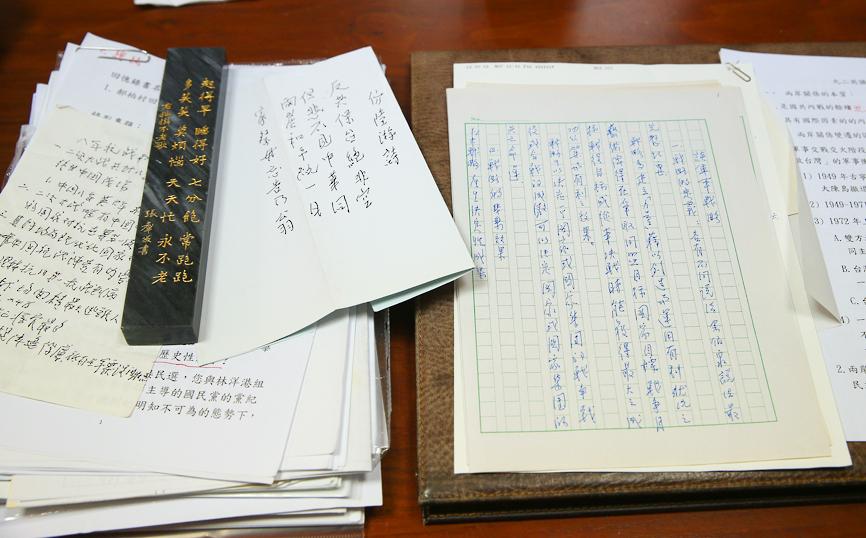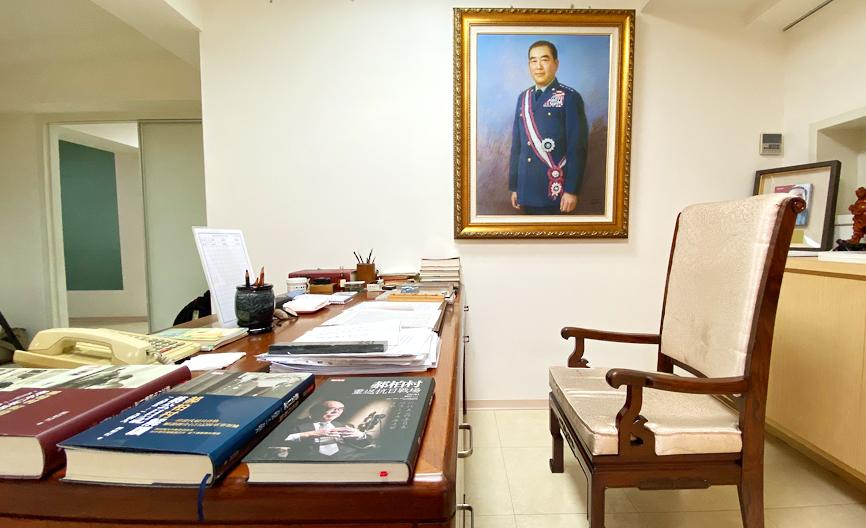Honoring former premier and chief of the general staff Hau Pei-tsun (郝柏村), who passed away on Monday, with a presidential citation is proper, as he had made great contributions to the nation, President Tsai Ing-wen (蔡英文) said yesterday.
Hau served as premier under then-president Lee Teng-hui (李登輝) from 1990 to 1993, athough the two belonged to different Chinese Nationalist Party (KMT) factions, with Lee leaning toward localization and democratization.
Hau’s contributions were especially important during the 823 Artillery Bombardment — the bombardment of Kinmen by China’s People’s Liberation Army on Aug. 23, 1958 — and so “conferring an official certificate of recognition upon him is proper and a matter of course,” Tsai said.

Photo: CNA
Former Taipei mayor Hau Lung-bin (郝龍斌), one of the former premier’s sons, said in a statement released by his office on Monday that the family was opening to discussing such a citation if contacted by the Presidential Office.
Hau Pei-tsun did not wish for any large funeral event, and preferred that things be kept simple, the office said.
Examination Yuan member Chou Yu-sun (周玉山), a long-time friend, yesterday showed reporters the former premier’s office on Dunhua S Road and some of his personal manuscripts.

Photo: CNA
The office has a study room, a bedroom and a reception area.
Asked whether Hau Pei-tsun hoped to receive a presidential citation, Chou said the former premier once told him that he would never accept a certificate of recognition from a Democratic Progressive Party administration.
Hau Pei-tsun had often said that he “loved China, but did not love the Chinese Communist Party [CCP], and loved Taiwan, but did not love [the idea of] Taiwanese independence,” Chou said.
After stepping down as premier, Hau Pei-tsun still went to the office every day to write, and over the course of 27 years wrote about 5 million words, including his memoirs and an analysis of former president Chiang Kai-shek’s (蔣介石) personal diary, Chou said.
“I had never before seen a retired person work so diligently,” he said.
Hau Pei-tsun went to his office daily up until April last year, when he was hospitalized, Chou said, adding that his desk was still covered in papers that he was writing at the time.
One of the documents was a poem in which he lamented that he would never see the day when China was peacefully united, he said.
Hau Pei-tsun’s office is simply furnished, which was demonstrative of his frugality, despite having held such high offices, Chou said.
He refuted claims that Hau Pei-tsun had been friendly with the CCP.
“This sort of claim is extremely ignorant. Hau Pei-tsun had criticized the CCP for distorting historical facts — he was completely anti-communist,” Chou said, adding that while Hau Pei-tsun was anti-communist, he did not support Taiwanese independence.

Taiwan has received more than US$70 million in royalties as of the end of last year from developing the F-16V jet as countries worldwide purchase or upgrade to this popular model, government and military officials said on Saturday. Taiwan funded the development of the F-16V jet and ended up the sole investor as other countries withdrew from the program. Now the F-16V is increasingly popular and countries must pay Taiwan a percentage in royalties when they purchase new F-16V aircraft or upgrade older F-16 models. The next five years are expected to be the peak for these royalties, with Taiwan potentially earning

POSITIVE DEVELOPMENT: Japan and the US are expected to hold in-depth discussions on Taiwan-related issues during the meeting next month, Japanese sources said The holding of a Japan-US leaders’ meeting ahead of US President Donald Trump’s visit to China is positive news for Taiwan, former Japan-Taiwan Exchange Association representative Hiroyasu Izumi said yesterday. After the Liberal Democratic Party’s landslide victory in Japan’s House of Representatives election, Japanese Prime Minister Sanae Takaichi is scheduled to visit the US next month, where she is to meet with Trump ahead of the US president’s planned visit to China from March 31 to April 2 for a meeting with Chinese President Xi Jinping (習近平). Japan and the US are expected to hold in-depth discussions on Taiwan-related issues during the

‘LIKE-MINDED PARTNER’: Tako van Popta said it would be inappropriate to delay signing the deal with Taiwan because of China, adding he would promote the issue Canadian senators have stressed Taiwan’s importance for international trade and expressed enthusiasm for ensuring the Taiwan-Canada trade cooperation framework agreement is implemented this year. Representative to Canada Harry Tseng (曾厚仁) in an interview with the Central News Agency (CNA) said he was increasingly uneasy about Ottawa’s delays in signing the agreement, especially as Ottawa has warmed toward Beijing. There are “no negotiations left. Not only [is it] initialed, we have three versions of the text ready: English, French and Mandarin,” Tseng said. “That tells you how close we are to the final signature.” Tseng said that he hoped Canadian Prime Minister Mark Carney

STAY IN YOUR LANE: As the US and Israel attack Iran, the ministry has warned China not to overstep by including Taiwanese citizens in its evacuation orders The Ministry of Foreign Affairs (MOFA) yesterday rebuked a statement by China’s embassy in Israel that it would evacuate Taiwanese holders of Chinese travel documents from Israel amid the latter’s escalating conflict with Iran. Tensions have risen across the Middle East in the wake of US and Israeli airstrikes on Iran beginning Saturday. China subsequently issued an evacuation notice for its citizens. In a news release, the Chinese embassy in Israel said holders of “Taiwan compatriot permits (台胞證)” issued to Taiwanese nationals by Chinese authorities for travel to China — could register for evacuation to Egypt. In Taipei, the ministry yesterday said Taiwan